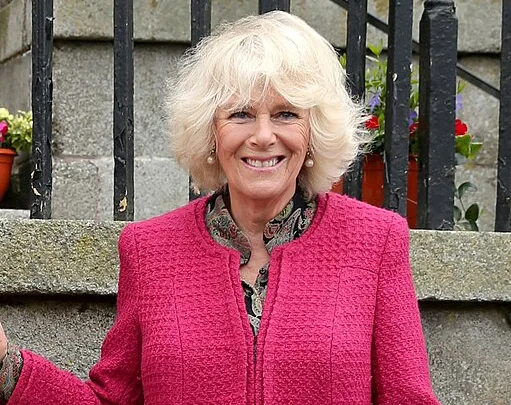Queen Camilla and King Charles experience disappointment as their horse, Gilded Water, fails to win the King George V stakes at Royal Ascot despite high hopes
Queen Camilla and King Charles, prominent figures in the British royal family, witnessed a moment of dashed hopes and tension at this year’s Royal Ascot as their prized thoroughbred, Gilded Water, competed in the prestigious King George V Stakes. Known for their avid interest in horse racing, the royal couple had eagerly anticipated a repeat of their previous year’s victory in the same race.
Gilded Water, bred by the late Queen Elizabeth II, entered the race amidst high expectations but faced stiff competition. Queen Camilla, closely following the race through binoculars, displayed visible distress as their horse failed to clinch the coveted first-place finish, with the victory going instead to the competitor, Going the Distance.
Embed from Getty ImagesDespite the disappointing outcome, Queen Camilla maintained an elegant appearance, dressed in a striking white ensemble accentuated by an emerald green brooch and a matching race day sun hat. King Charles, by her side, wore a traditional grey morning suit paired with a vibrant blue waistcoat and a classic black top hat. Together, they observed the race from the royal balcony, sharing in the emotional rollercoaster of the event.
Earlier in the week, King Charles had affirmed his commitment to attending Royal Ascot despite ongoing health challenges, including his treatment for cancer. His presence at the event, leading the carriage procession alongside Queen Camilla, underscored his dedication to upholding royal traditions and honouring his late mother’s memory through their shared passion for equestrian sports.
Royal Ascot, a cornerstone of the British social calendar, holds significance beyond its sporting spectacle. It serves as a platform where royalty, celebrities, and spectators converge to witness top-class racing and showcase high fashion. For Queen Camilla and King Charles, their attendance at such events not only reflects their personal interests but also reinforces the monarchy’s enduring cultural role in British society.
Analysis:
Political: The presence of Queen Camilla and King Charles at Royal Ascot holds political implications as it reinforces the continuity and stability of the British monarchy amidst King Charles’s ongoing health challenges. Despite undergoing cancer treatment, King Charles’s decision to attend the prestigious event underscores his commitment to fulfilling royal duties and maintaining public appearances. In the context of constitutional monarchy, where the royal family plays a ceremonial role in national life, their attendance at events like Royal Ascot serves to reassure the public and stakeholders of the monarchy’s enduring presence and relevance. This continuity is crucial in maintaining public confidence and support for the institution, especially during periods of personal and health-related adversity for senior members of the royal family.
Social: Queen Camilla’s visible distress during the race at Royal Ascot humanizes the royal family and underscores their personal investment in equestrian sports and cultural traditions. Beyond its sporting significance, Royal Ascot is a social and cultural event that brings together royalty, celebrities, and the public to celebrate British heritage and fashion. Queen Camilla’s choice of attire, including her elegant white ensemble and distinctive accessories, contributes to discussions on royal fashion and style trends. Such appearances not only highlight her role as a fashion icon but also reinforce the royal family’s role in setting cultural norms and standards. The emotional response of Queen Camilla to Gilded Water’s defeat resonates with the public, showcasing the personal stakes and passions of the royal family in events that hold national pride and cultural significance.
Gender: Queen Camilla’s presence and fashion choices at Royal Ascot highlight her influential role as a female member of the royal family. Her attire and demeanour contribute to discussions on royal style and representation, influencing fashion trends and perceptions globally. As a public figure, Queen Camilla’s presence at Royal Ascot serves to promote British designers and fashion houses while reinforcing traditional and contemporary styles associated with royalty. This aspect of her role contributes to broader conversations on gender representation and influence within the monarchy, showcasing the diverse roles and responsibilities undertaken by female members of the royal family.
Economic: Royal Ascot holds significant economic implications, contributing to the tourism, hospitality, and retail sectors in the UK. The event attracts international visitors and media coverage, generating substantial revenue through ticket sales, corporate hospitality packages, and sponsorship deals. Local economies benefit from increased visitor spending on accommodation, dining, and retail, while British brands and businesses capitalize on the event’s global platform to showcase their products and services. The economic impact extends beyond the immediate event period, with long-term benefits for tourism promotion and brand visibility associated with British cultural heritage and traditions. As a high-profile event, Royal Ascot supports job creation, stimulates consumer spending, and enhances the UK’s reputation as a destination for luxury and sporting events.
